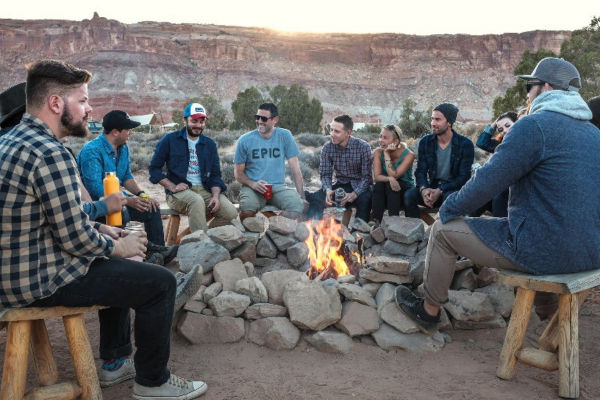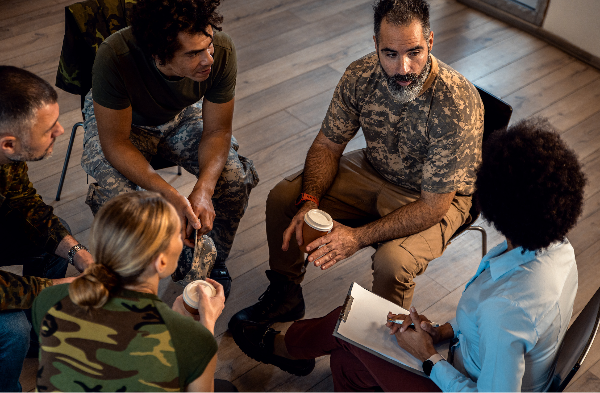Group Therapy: A Supportive Space for First Responders
- Apr 28, 2025
- 6 min read
Updated: Oct 14, 2025

The emotional and psychological demands placed on first responders are immense, and the search for effective support can feel overwhelming. You deserve a solution that truly addresses the unique challenges you face. This guide will provide a comprehensive look at how group therapy can be a powerful tool for healing, specifically tailored to the experiences of first responders.
What makes group therapy uniquely beneficial for first responders?
Group therapy provides a sanctuary where first responders find mutual understanding and camaraderie among peers who "just get it," fostering a safe, judgment-free space to share experiences and coping strategies. This shared experience reduces feelings of isolation and stigma, leading to profound healing.
We've only just scratched the surface of how group therapy can be a transformative resource. Keep reading to discover the five key benefits of this therapeutic approach and how to access these services through workers’ compensation.
The Healing Power of Group Therapy
The weight of responsibility and the front-row seat to trauma can, unsurprisingly, bear heavily on their mental well-being. While individual therapy offers a profound space for introspection, there's an underestimated power in the shared experience that group therapy offers.
For first responders, group therapy can be a sanctuary, offering mutual understanding, camaraderie, and healing.
The Gift of Shared Experience
There's something uniquely therapeutic about being in a room with people who 'just get it.'
First responders have distinct experiences, and while every story is unique, the themes often resonate. Group therapy creates a supportive environment where participants don't have to explain the nuances of their job or the intricacies of their trauma.
They're surrounded by peers who intimately understand the highs and lows of the role.
Benefits of Group Therapy for First Responders:
#1 Safe Space to Share:
Group therapy provides a confidential environment where first responders can freely share their feelings and experiences without judgment. The collective understanding in the room fosters a deep sense of trust.
American Group Psychotherapy Association (AGPA)
AGPA provides information about the dynamics of group therapy and how it establishes a safe space for individuals to share their experiences.
International Journal of Group Psychotherapy
A scholarly journal that offers numerous articles and studies emphasizing the importance and efficacy of creating a safe space within group therapy.
#2 Learning through Others:
Hearing others share their coping strategies and recovery journeys can be enlightening. It offers diverse perspectives and solutions that one might not have considered in individual therapy.
Psych Central - Group Therapy: How it Works and the Benefits of Attending
This article sheds light on the learning dynamics present in group therapy settings.
Mayo Clinic provides insights into how group therapy facilitates learning through the experiences of others.
#3 Sense of Belonging:
Isolation can be a significant challenge for first responders battling mental health issues. Knowing they're not alone in their struggles can be incredibly affirming.
Psychology Today - Why We Need a Sense of Belonging
This article discusses the psychological significance of belonging and how group settings can foster it.
Harvard Business Review - The Value of Belonging at Work
While this resource is more oriented towards the corporate world, it elucidates the importance of belonging in collaborative settings, which is relevant to group therapy.
#4 Feedback and Perspective:
Members can offer feedback, helping others see issues from different angles. This broader perspective can lead to breakthroughs and deeper understanding.
Verywell Mind - What to Expect During Group Therapy
This resource offers insights into the dynamics of feedback and gaining perspectives in a group therapy context.
Mind - Group Therapy and Peer Support
The UK-based organization provides information on how peer feedback in group therapy can be instrumental in personal growth.
#5 Reduced Stigma:
Mental health discussions can still face societal stigma. Being in a group where everyone understands the importance of mental well-being can help reduce feelings of shame or guilt.
Mental Health America (MHA) - Stigma Free & Toolkits
MHA promotes understanding and positive perspectives about mental health, thereby working towards reducing stigma.
National Alliance on Mental Illness (NAMI) - StigmaFree
NAMI offers resources on how shared experiences, like those in group therapy, can help break down the barriers of stigma surrounding mental health.

Making Group Therapy Accessible: Workers’ Compensation
But how can first responders access these group therapy sessions? Here's where understanding workers' compensation comes in handy. More and more, the realm of workers' compensation is recognizing the importance of mental health, especially for roles rife with traumatic exposure.
While it was traditionally associated with physical injuries, many states now acknowledge the toll on mental health that some professions, especially first responders, face. Under workers' compensation, group therapy sessions can be covered, making it not only a viable option but also an accessible one. First responders looking to explore this route should review their compensation policies or discuss with HR to ensure they can leverage these benefits.
See Chateau Health & Wellness' Intro Guide to First Responder Worker's Comp >>
First responders perform an invaluable service to society, often putting their well-being on the line. While the physical risks of the job are evident, the emotional and psychological tolls are less visible but just as profound. Group therapy offers a unique blend of shared experience, mutual understanding, and collective healing, making it an ideal therapeutic option for our everyday heroes.
As society increasingly recognizes the mental toll on first responders, it’s heartening to see avenues like workers' compensation evolve to offer support. Group therapy isn't just a space to talk; it's a space to heal, grow, and rediscover one's strength.
For first responders, it's not just therapy; it's a community.
The Substance Abuse and Mental Health Services Administration (SAMHSA)SAMHSA provides a range of resources on group therapy, including its benefits, best practices, and how it supports various populations, including first responders.
The International Critical Incident Stress Foundation (ICISF)ICISF offers training, resources, and services related to Critical Incident Stress Management, which is often utilized by first responders. They also provide resources on group debriefings, which resemble group therapy sessions, aimed at addressing traumatic events.
Psychology TodayPsychology Today has numerous articles on the benefits of group therapy, detailing the dynamics and advantages of such therapeutic environments. The magazine also has a directory of therapists, which can be filtered by specialty (e.g., trauma and PTSD)
Frequently Ask Questions:
• What is the "gift of shared experience" in group therapy for first responders?
The gift of shared experience is the unique benefit of being in a room with peers who intimately understand the highs and lows of a first responder's role. This shared understanding means participants don't have to explain the nuances of their job or trauma, which fosters a deep sense of connection.
• How does group therapy help with the feeling of isolation?
Group therapy addresses isolation by creating a sense of belonging. Knowing they're not alone in their struggles can be incredibly affirming for first responders battling mental health issues, as they are surrounded by others who understand their experiences.
• Can group therapy sessions be covered by workers' compensation?
Yes, many states now acknowledge the mental health toll on first responders and recognize it under workers' compensation. This means group therapy sessions can be covered, making them a viable and accessible option.
• How does group therapy help reduce the stigma around mental health?
Being in a group where everyone understands the importance of mental well-being helps reduce feelings of shame or guilt. This collective understanding works to break down the societal stigma surrounding mental health discussions.
• What role does feedback play in group therapy?
Members in group therapy can offer feedback and diverse perspectives, helping others see issues from different angles. This broader perspective can lead to breakthroughs and a deeper understanding of personal challenges.
When the weight of the world feels too heavy to carry alone, know that our team at Chateau Health & Wellness Treatment Center is here to walk alongside you. We are deeply committed to providing first responders with the specialized support they deserve, understanding the unique challenges you face. If you or a loved one is seeking a space to heal, grow, and rediscover strength, we encourage you to reach out. Our compassionate professionals are ready to help you navigate your journey toward wellness. Call us today at (435) 222-5225 to learn more about how we can support you.

About The Author
Ben Pearson, LCSW - Clinical Director
With 19 years of experience, Ben Pearson specializes in adolescent and family therapy, de-escalation, and high-risk interventions. As a former Clinical Director of an intensive outpatient program, he played a key role in clinical interventions and group therapy. With 15+ years in wilderness treatment and over a decade as a clinician, Ben has helped countless individuals and families navigate mental health and recovery challenges.







